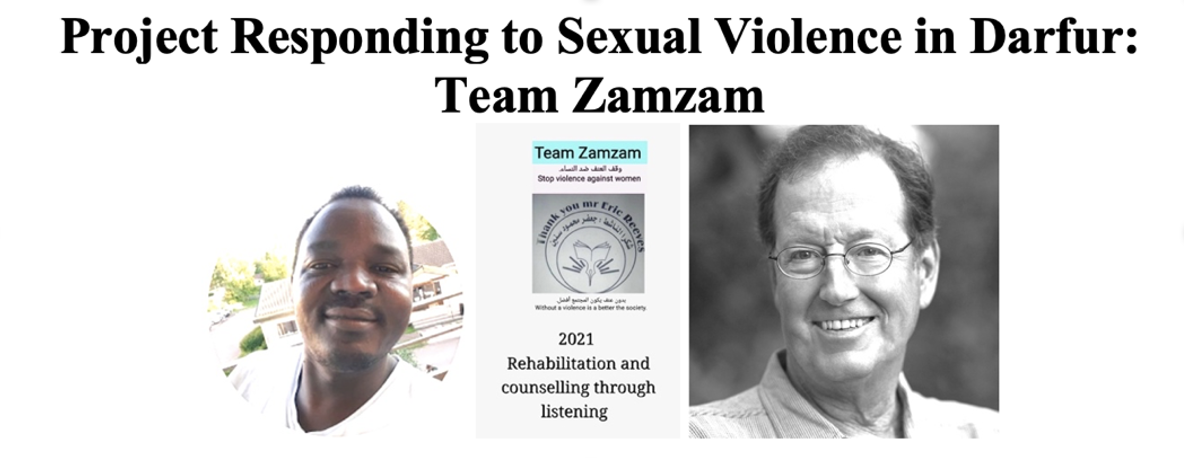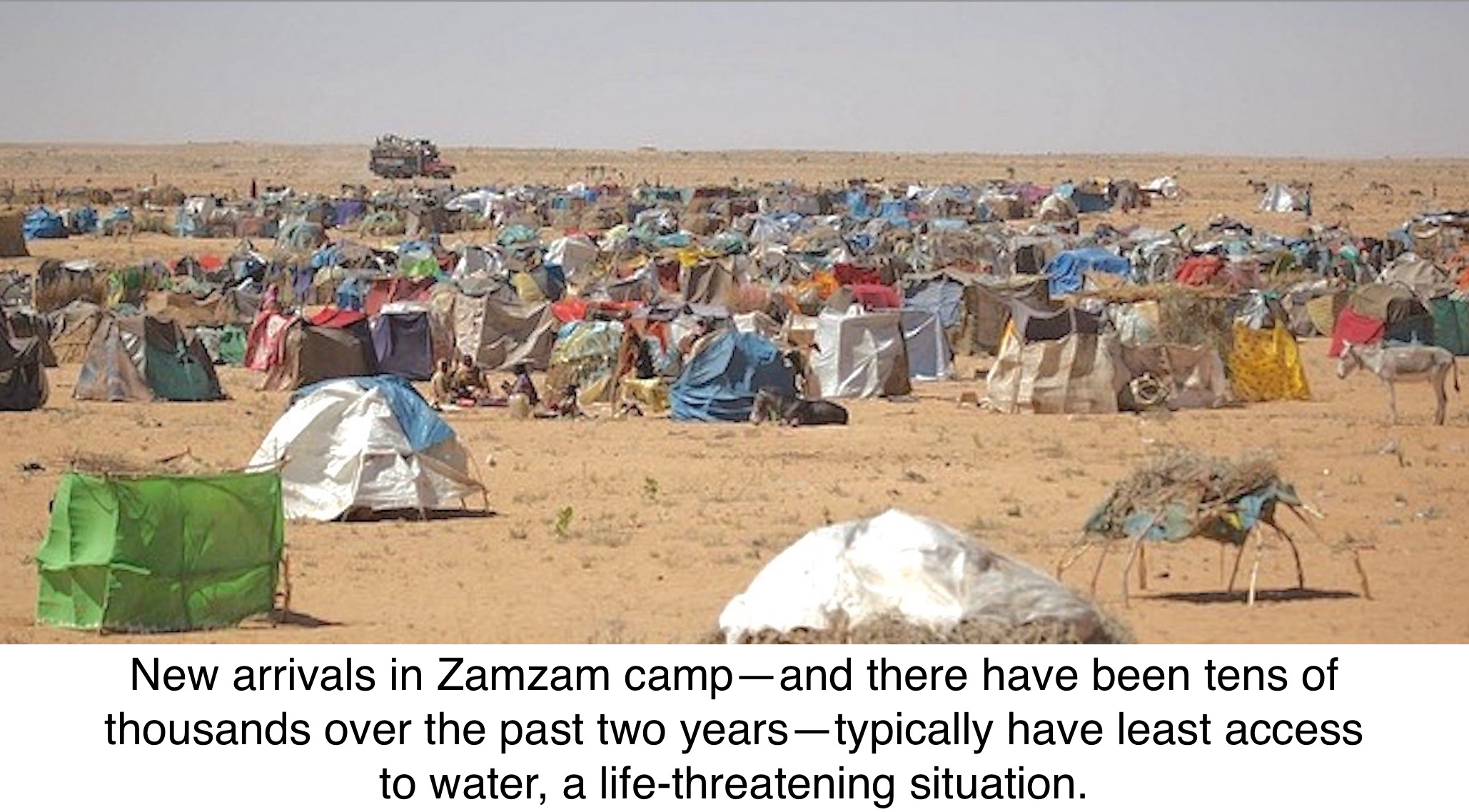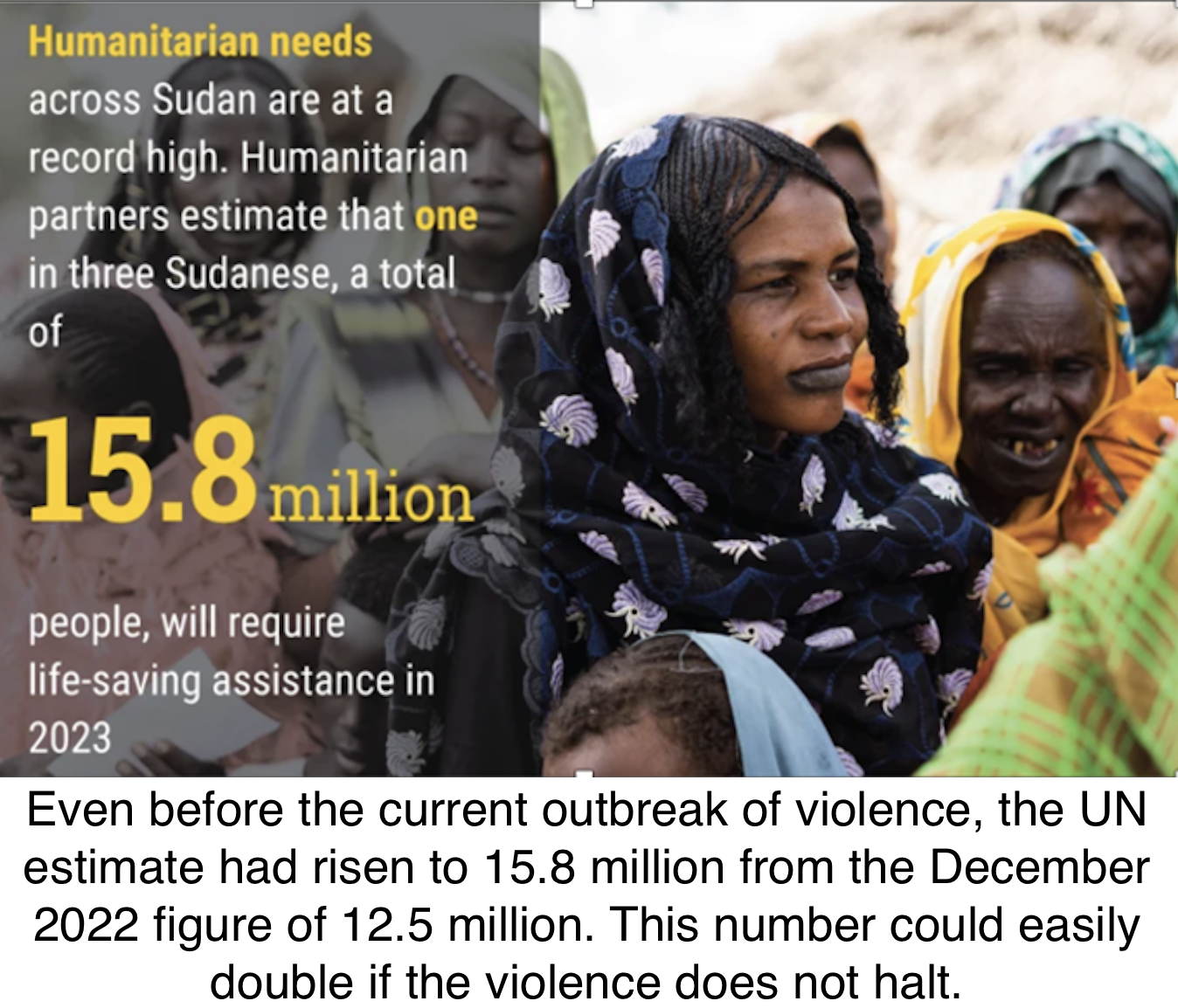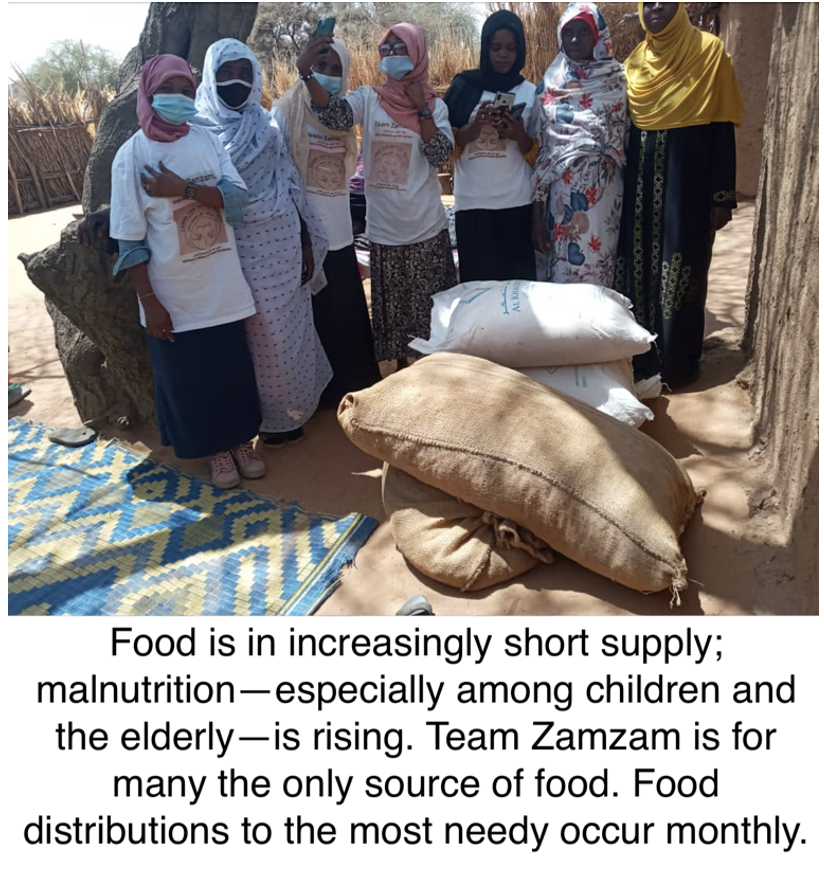Gaffar Mohammud Saeneen and Eric Reeves, Co-Chairs
Nancy Reeves, Editor and Funding Advisor; Julie Darcq, Online Campaign Coordinator
Overview (Eric)
For reasons of my own schedule, this update comes a week earlier than normal. But even in the period covered, there is a great deal to report. Insecurity and scarcity are increasing at terrifying rates in Darfur. All humanitarian sectors in North Darfur, as well as much of the other Darfur states, are desperately inadequate: food, clean water, medicine, hygiene. And without humanitarian organizations on the ground because of insecurity, conditions will only worsen as the violence in Khartoum continues to metastasize throughout all of Sudan.
In Darfur the violence takes the form of increasingly aggressive attacks on towns by the Rapid Support Forces (RSF) of Hamdan Dagalo (“Hemedti’) and its Janjaweed militia allies. By May of this year, El Geneina (capital of West Darfur) was completely overwhelmed, with perhaps 10,000 deaths from ethnically targeted killing of the non-Arab Masalit people. Hundreds of thousands fled to Chad and Adré in particular, where humanitarian capacity is woefully inadequate. (U.S. Ambassador to the UN, Linda Thomas-Greenfield, gave a shamefully inadequate account of this growing catastrophe in a September 7, 2023 interview.)
In Central Darfur the capital, Zalingei, has also been completely overwhelmed by the RSF. Radio Dabanga, with an extraordinary legion of sources on the ground throughout Darfur, reported the consequences in a September 1, 2023 dispatch: residents likened Zalingei a “ghost town.” Ethnically targeted detentions by RSF were rampant. The town’s hospital was left without staff or supplies. And humanitarian access has been denied. The regular army forces (the SAF) proved unwilling to do more than hold its fortified positions.
Fighting also rages in Nyala, capital of South Darfur and once the largest city in Darfur. Much of the city now lies in ruins, corpses litter the streets, food and water are increasingly scarce. Huge numbers of people have fled to save their lives, creating another vast exodus of internally displaced persons (IDPs)—many of them heading to Zamzam camp, perhaps as many as 50,000 new arrivals and more on the way.
This may very well be the future of all of Darfur if Hemedti’s forces prevail.
And while El Fasher—fifteen miles to the northeast of Zamzam—remains something of an island of security in this vast cauldron of violence, there as well the RSF and Janjaweed militias are attacking frequently. This makes life for the displaced persons of Zamzam—some 450,000 altogether with new arrivals—increasingly difficult, indeed for many unbearable. Young men often leave for other parts of Sudan or as expatriates.
Roughly seventy-five percent of Zamzam’s population consists of women and children—a great many of them orphans, disabled, the very elderly, and deeply impoverished families. For them, food is scarce, both because of the collapse of transport and because the RSF and Janjaweed have again this agricultural season violently prevented farmers from working their lands. Extremely high inflation is a blight for all of Sudan, but the effect on food prices in Darfur has been almost beyond comprehension. There has never been anything like it in living memory.
And with the impending end of the rainy season, clean water will again be a critical problem.
Health services don’t begin to address the legion of illnesses proliferating, particularly mosquito-borne diseases such as malaria and dengue fever.
Sexual violence is again on the rise.
These and other issues as they affect Zamzam IDP camp have been detailed in a remarkably full account from the coordinating counselor of Project Zamzam, an account that gives voice to a wide range of those suffering from deprivation of all kinds. For its part Team Zamzam likely represents the most important humanitarian effort on the ground inside the camp. Her account may be found in the ANNEX to this month’s Update, and I strongly encourage a close reading: the picture of struggles for life in Zamzam is rendered with painful clarity.
And yet despite the violence, despite the shortages, despite the increasing suffering, Team Zamzam continues its tasks with courage, a strong esprit de corps, and a relentless commitment to do as much as possible with the resources available. Twenty women are making a huge difference in the lives of many who would otherwise suffer intolerably or die.
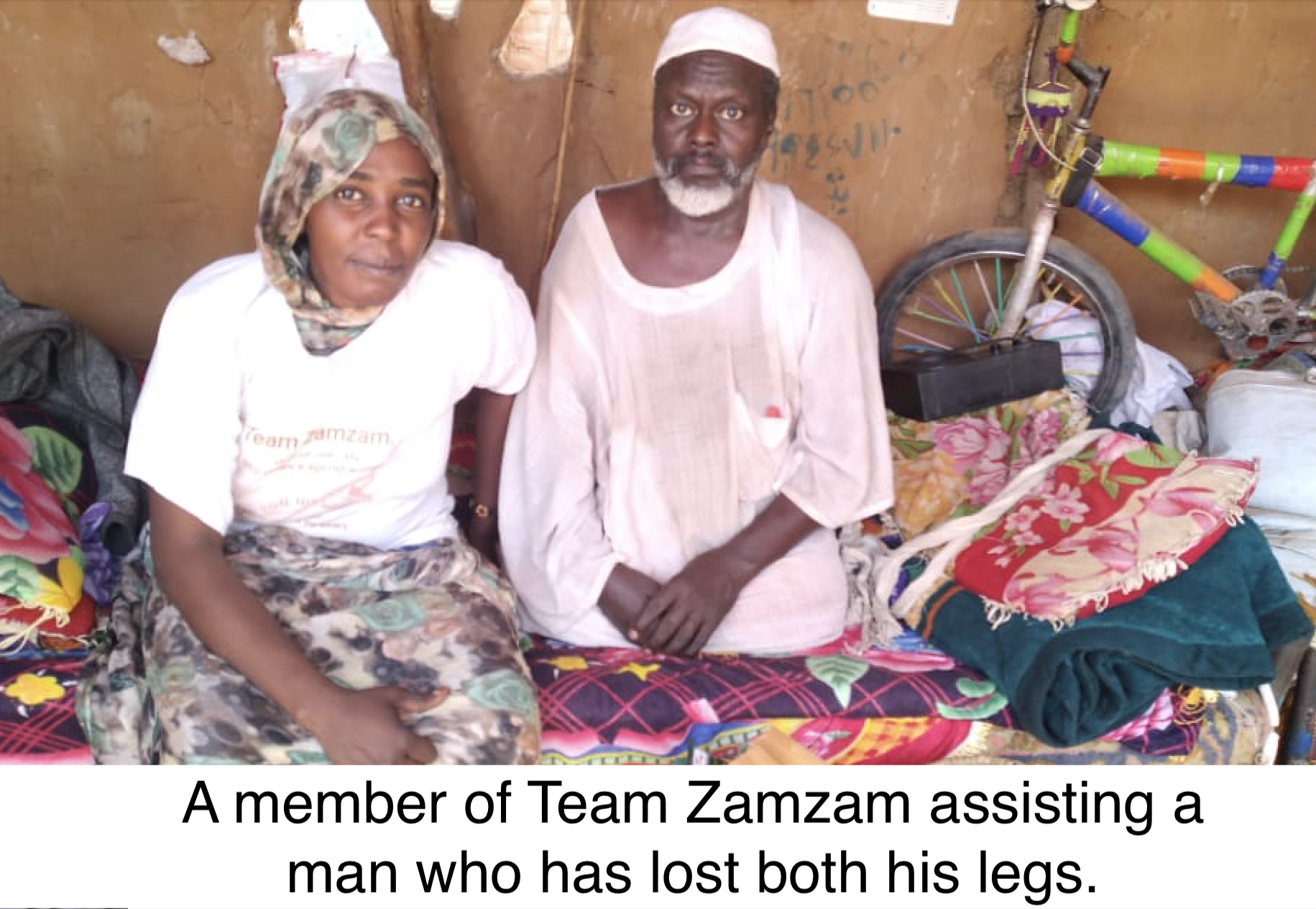
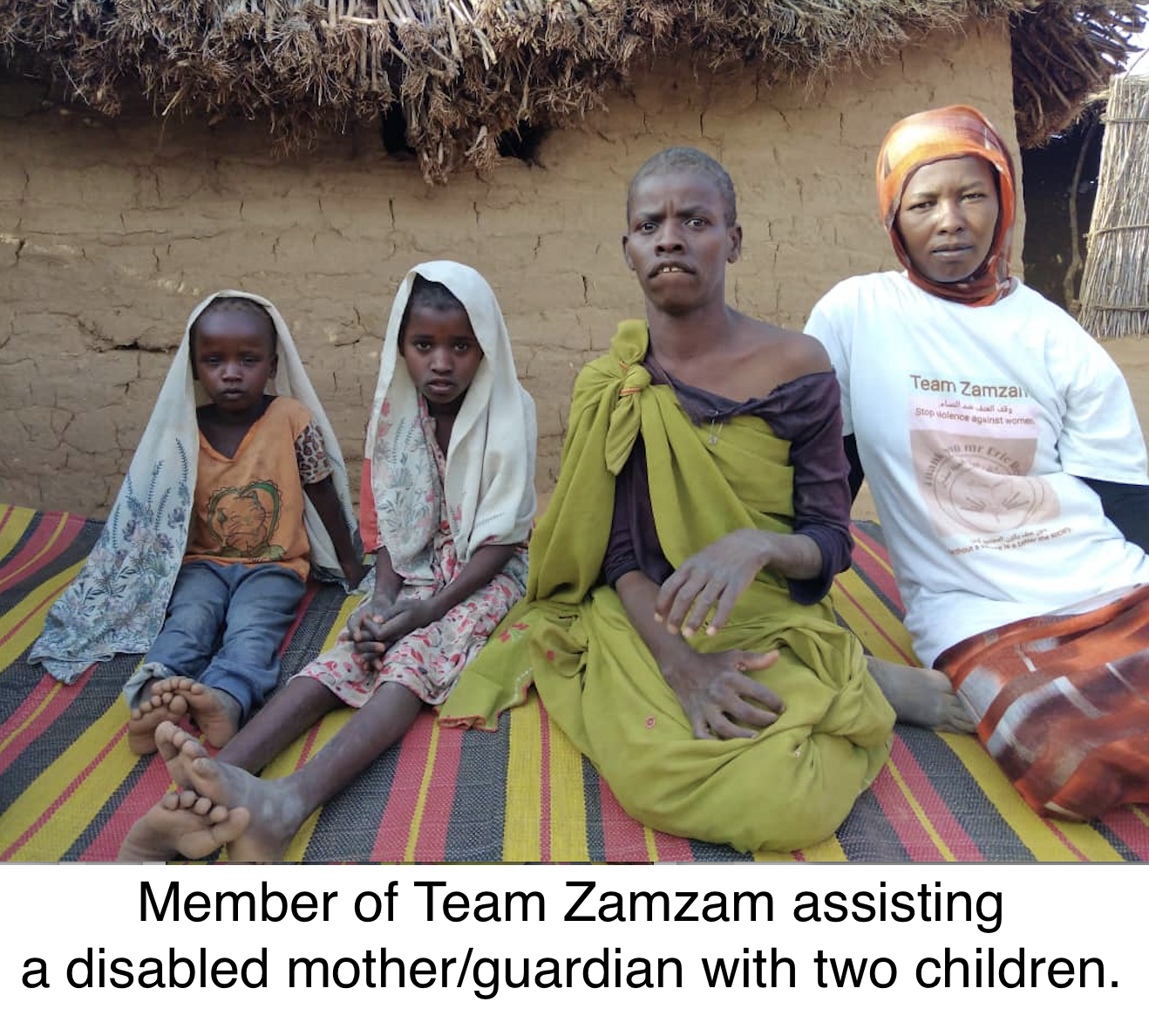 To be sure, in a camp the size of Zamzam, only a small portion of what is needed can be provided. But aided by two men on the team—providing security, transportation, and assistance in the physical distribution of food supplies—the women of Team Zamzam (the “Sisters,” as they are commonly called) have assisted many thousands of people over the three years of the Project. And they are constantly assessing the condition of new arrivals as well as the four quadrants of Zamzam, which has an enormous geographical footprint.
To be sure, in a camp the size of Zamzam, only a small portion of what is needed can be provided. But aided by two men on the team—providing security, transportation, and assistance in the physical distribution of food supplies—the women of Team Zamzam (the “Sisters,” as they are commonly called) have assisted many thousands of people over the three years of the Project. And they are constantly assessing the condition of new arrivals as well as the four quadrants of Zamzam, which has an enormous geographical footprint.
Notably, a substantial grant for food assistance has allowed Team Zamzam to double its provision of food to the most needy, with two major distributions of food in the past three weeks (see below). Sadly, food inflation inevitably and significantly diminishes the purchasing power of Team Zamzam’s monthly budget.
But the original mission of the Project remains central: to assist girls and women traumatized by brutal sexual violence at the hands of the RSF and its Janjaweed militia allies. The report from the coordinating counselor gives recent examples girls raped by the Janjaweed, as well as an account of the excruciating existence of a young woman who suffered for years from the pain and social ostracization that accompany traumatic fistulas. Suicidal ideation, and actualization, are distressingly common. Three fistula surgeries—all that our budget allows—were funded in recent weeks for victims most urgently in need. Sadly, the waiting list for such surgery remains over 200.
Counseling sessions—both group and individual—continue, with enthusiastic and grateful responses from those helped. Since the last Update, Team Zamzam has conducted 42 in-depth individual counseling sessions as well as 16 group counseling sessions addressing sexual violence. More than 5,000 girls and women have been assisted through counseling over the past three years.
Many other tasks fall to Team Zamzam, and they undertake them with a sense of urgency and compassion:
Since August 22, the following have been undertaken—a truly remarkable achievement:
- 42 assessment visits carried out within the four sections of Zamzam camp to evaluate living conditions, health conditions, and take notes on the main concerns of the people.
- 8 emergency visits carried out within the neighborhoods of Al-Basharia in El-Fasher to evaluate living conditions, health conditions, distribute basic necessities, and take notes on their main concerns of the recently displaced who are sheltered in the neighborhood schools.
- 58 patients suffering from various illnesses and medical issues—including 11 pregnant women and 3 fistula patients—have been accompanied to different hospitals for medical treatment, medical consultation and routine checkups.
- 5 meetings were held with representatives from different neighbourhoods, women’s groups and youth volunteer groups to discuss issues concerning the camp’s future, the population’s wellbeing, and present challenges.
- 42 individual counseling sessions by Team Zamzam counselors and 16 group counseling sessions addressing sexual violence.
- 8 health guidance workshops on how necessary clean water is for a healthy life and how to avoid using polluted water.
An account of the two major food distributions are discussed in the Report of the coordinating counselor—again appearing here as an ANNEX.
The international community has yet to show the will or resourcefulness to ensure that humanitarian conditions in Darfur improve in a way even vaguely commensurate with the scale of the crisis. For now, Team Zamzam is doing the most important work in Zamzam IDP camp.
How to Help
Assistance is urgently needed and will be greatly appreciated by Team Zamzam, and by the girls and women whose suffering they seek to alleviate. Increasingly importantly, the distribution of food and medicine presently is all that assists many within the camp who are daily moving closer to starvation (see above). Here I should also stress the tremendous efficiencies of purchases by a staff with local knowledge, as well as the value of their deep understanding of where need is greatest within this vast camp, swollen with recent displacements caused by insecurity.
NB: It is now possible to make a tax-deductible contribution to our project, using a portal on the website of a 501/c/3 organization operating in Sudan. Operation Broken Silence, working primarily on health and education issues in the Nuba Mountains of South Kordofan, has created a special site for a tax-deductible contributions to our project, and we hope this makes contributing to the health and well-being of girls and women in Zamzam easier for Donors.
We also hope that all will keep in mind our project as a whole operates with truly extraordinary efficiency, in ways matched by no humanitarian organization operating in Darfur that I am aware of, a region I have been researching for two decades. There is absolutely no overhead for this project.
Those wishing to assist in funding the work of Team Zamzam may also send a check directly to Eric (Eric Reeves, 31 Franklin St., Northampton, MA 01060)
or
Purchase one of his woodturnings: https://www.ericreeves-woodturner.com/gallery
100% of the purchase price of every woodturning directly supports the project in Zamzam.
Previous updates are archived at: https://www.ericreeves-woodturner.com/blog/
A “You Tube” video of Eric describing the project can be found at: https://youtu.be/QsRUa7GoVgY

